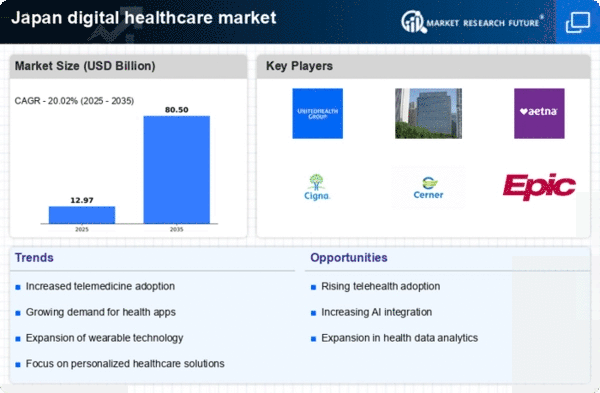Focus on Preventive Healthcare
The emphasis on preventive healthcare is reshaping the digital healthcare market in Japan. With rising healthcare costs and an aging population, there is a growing recognition of the importance of preventive measures to maintain health and reduce the burden on healthcare systems. Digital tools that facilitate health screenings, lifestyle tracking, and early intervention are becoming integral to healthcare strategies. This shift towards prevention is likely to enhance the overall efficiency of healthcare delivery, potentially reducing hospital admissions by 15% over the next few years. As preventive healthcare gains traction, the digital healthcare market is expected to evolve, with innovative solutions emerging to support this paradigm shift.
Government Initiatives and Support
Government initiatives play a crucial role in shaping the digital healthcare market in Japan. The Japanese government has been actively promoting the adoption of digital health technologies through various policies and funding programs. For example, the Ministry of Health, Labour and Welfare has introduced subsidies for healthcare providers to implement electronic health records and telemedicine solutions. These initiatives aim to improve healthcare accessibility and efficiency, particularly in underserved regions. As a result, the digital healthcare market is expected to expand significantly, with government support potentially accounting for a 30% increase in market growth over the next few years. This proactive approach indicates a commitment to modernizing healthcare delivery in Japan.
Integration of Advanced Technologies
The integration of advanced technologies into the digital healthcare market is transforming the landscape of medical services in Japan. Technologies such as artificial intelligence (AI), machine learning, and big data analytics are being utilized to improve diagnostic accuracy and patient outcomes. For instance, AI algorithms can analyze vast amounts of health data to identify patterns and predict potential health issues. This technological advancement is expected to enhance operational efficiency within healthcare facilities, potentially reducing costs by up to 20%. As healthcare providers increasingly adopt these technologies, the digital healthcare market is likely to witness substantial growth, with an estimated market value reaching $25 billion by 2027.
Growing Health Consciousness Among Consumers
There is a noticeable increase in health consciousness among consumers in Japan, which is positively impacting the digital healthcare market. As individuals become more aware of their health and wellness, they are seeking digital solutions to monitor and manage their health. Wearable devices, health apps, and online health platforms are gaining popularity, allowing users to track vital signs and receive personalized health recommendations. This trend is likely to drive the demand for digital healthcare services, as consumers increasingly prefer proactive health management. The market for health and wellness apps alone is projected to reach $5 billion by 2026, reflecting the growing interest in digital health solutions among the Japanese population.
Rising Demand for Remote Healthcare Services
Japan's digital healthcare market is experiencing a surge in demand for remote healthcare services. This trend is driven by an increasing population of elderly individuals, who often require ongoing medical attention. As of 2025, approximately 28% of Japan's population is aged 65 and older, necessitating innovative solutions to provide care. Remote consultations and telehealth services are becoming essential, allowing healthcare providers to reach patients in rural areas. The convenience and accessibility of these services are likely to enhance patient satisfaction and adherence to treatment plans. Furthermore, the digital healthcare market is projected to grow at a CAGR of 15% over the next five years, indicating a robust shift towards remote healthcare solutions.
















